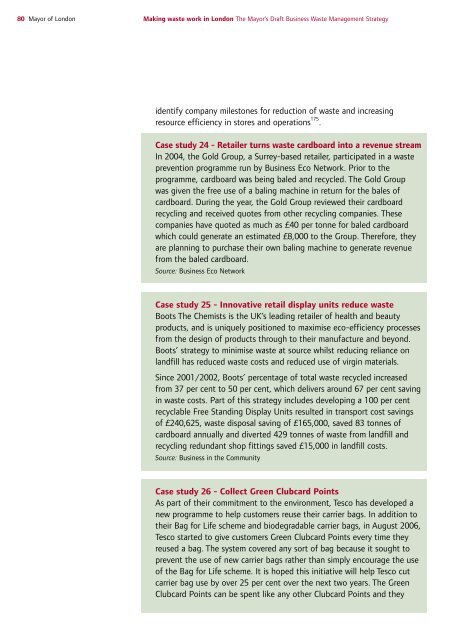Draft Business Waste Strategy PDF - london.gov.uk - Greater ...
Draft Business Waste Strategy PDF - london.gov.uk - Greater ...
Draft Business Waste Strategy PDF - london.gov.uk - Greater ...
You also want an ePaper? Increase the reach of your titles
YUMPU automatically turns print PDFs into web optimized ePapers that Google loves.
80 Mayor of London<br />
Making waste work in London The Mayor’s <strong>Draft</strong> <strong>Business</strong> <strong>Waste</strong> Management <strong>Strategy</strong><br />
identify company milestones for reduction of waste and increasing<br />
resource efficiency in stores and operations 175 .<br />
Case study 24 - Retailer turns waste cardboard into a revenue stream<br />
In 2004, the Gold Group, a Surrey-based retailer, participated in a waste<br />
prevention programme run by <strong>Business</strong> Eco Network. Prior to the<br />
programme, cardboard was being baled and recycled. The Gold Group<br />
was given the free use of a baling machine in return for the bales of<br />
cardboard. During the year, the Gold Group reviewed their cardboard<br />
recycling and received quotes from other recycling companies. These<br />
companies have quoted as much as £40 per tonne for baled cardboard<br />
which could generate an estimated £8,000 to the Group. Therefore, they<br />
are planning to purchase their own baling machine to generate revenue<br />
from the baled cardboard.<br />
Source: <strong>Business</strong> Eco Network<br />
Case study 25 - Innovative retail display units reduce waste<br />
Boots The Chemists is the UK’s leading retailer of health and beauty<br />
products, and is uniquely positioned to maximise eco-efficiency processes<br />
from the design of products through to their manufacture and beyond.<br />
Boots’ strategy to minimise waste at source whilst reducing reliance on<br />
landfill has reduced waste costs and reduced use of virgin materials.<br />
Since 2001/2002, Boots’ percentage of total waste recycled increased<br />
from 37 per cent to 50 per cent, which delivers around 67 per cent saving<br />
in waste costs. Part of this strategy includes developing a 100 per cent<br />
recyclable Free Standing Display Units resulted in transport cost savings<br />
of £240,625, waste disposal saving of £165,000, saved 83 tonnes of<br />
cardboard annually and diverted 429 tonnes of waste from landfill and<br />
recycling redundant shop fittings saved £15,000 in landfill costs.<br />
Source: <strong>Business</strong> in the Community<br />
Case study 26 - Collect Green Clubcard Points<br />
As part of their commitment to the environment, Tesco has developed a<br />
new programme to help customers reuse their carrier bags. In addition to<br />
their Bag for Life scheme and biodegradable carrier bags, in August 2006,<br />
Tesco started to give customers Green Clubcard Points every time they<br />
reused a bag. The system covered any sort of bag because it sought to<br />
prevent the use of new carrier bags rather than simply encourage the use<br />
of the Bag for Life scheme. It is hoped this initiative will help Tesco cut<br />
carrier bag use by over 25 per cent over the next two years. The Green<br />
Clubcard Points can be spent like any other Clubcard Points and they
















